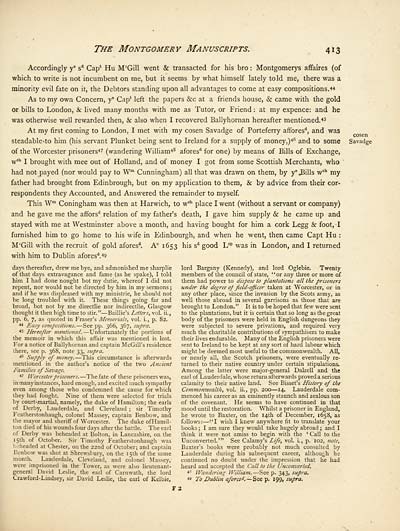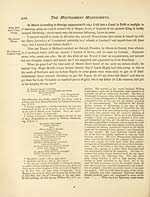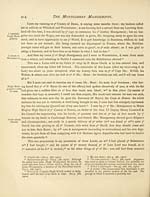Montgomery manuscripts
(427) Page 413
Download files
Complete book:
Individual page:
Thumbnail gallery: Grid view | List view

The Montgomery Manuscripts.
413
Accordingly y e s d Cap' Hu M'Gill went & transacted for his bro : Montgomerys affaires (of
which to write is not incumbent on me, but it seems by what himself lately told me, there was a
minority evil fate on it, the Debtors standing upon all advantages to come at easy compositions. 44
As to my own Concern, y° Cap' left the papers &c at a friends house, & came with the gold
or bills to London, & lived many months with me as Tutor, or Friend : at my expence: and he
was otherwise well rewarded then, & also when I recovered Ballyhornan hereafter mentioned. 45
At my first coming to London, I met with my cosen Savadge of Porteferry affores d , and was
steadable-to him (his servant Plunket being sent to Ireland for a supply of money,) 46 and to some
of the Worcester prisoners 47 (wandering William 48 afores d for one) by means of Bills of Exchange,
w ch I brought with mee out of Holland, and of money I got from some Scottish Merchants, who
had not payed (nor would pay to W m Cunningham) all that was drawn on them, by y° .Bills w ch my
father had brought from Edinbrough, but on my application to them, & by advice from their cor-
respondents they Accounted, and Answered the remainder to myself.
This W m Coningham was then at Harwich, to w ch place I went (without a servant or company)
and he gave me the affors d relation of my father's death, I gave him supply & he came up and
stayed with me at Westminster above a month, and having bought for him a cork Legg & foot, I
furnished him to go home to his wife in Edinbourgh, and when he went, then came Capt Hu :
M'Gill with the recruit of gold afores d . A 1653 his s d good L° p was in London, and I returned
with him to Dublin afores d . 4 9
days thereafter, drew me bye, and admonished me sharplie
of that days extravagance and fame (as he spake), I told
him I had done nought bot my dutie, whereof I did not
repent, nor would not be directed by him in my sermons ;
and if he was displeased with my ministrie, he should not
be long troubled with it. These things going far and
broad, bot not by me directlie nor indirectlie, Glasgow
thought it then high time to stir. "— Baillie's Leilas, vol. ii.,
pp. 6, 7, as quoted in Fraser's Memorials, vol. i. , p. 82.
44 Easy compositions. — See pp. 366, 367, supra.
45 Hereafter mentioned. — Unfortunately the portions of
the memoir in which this affair was mentioned is lost.
For a notice of Ballyhornan and captain McGill's residence
there, see p. 368, note 33, supra.
46 Supply of money. — This circumstance is afterwards
mentioned in the author's notice of the two Ancient
Families of Savage.
47 Worcester prisoners. — The fate of these prisoners was,
in many instances, hard enough, and excited much sympathy
even among those who condemned the cause for which
they had fought. Nine of them were selected for trials
by court-martial, namely, the duke of Hamilton; the earls
of Derby, Lauderdale, and Cleveland ; sir Timothy
Featherstonhaugh, colonel Massey, captain Benbow, and
the mayor and sheriff of Worcester. The duke ofHamil-
ton died of his wounds four days after the battle. The earl
of Derby was beheaded at Bolton, in Lancashire, on the
15th of October. Sir Timothy Featherstonhaugh was
beheaded at Chester, on the 22nd of October; and captain
Benbow was shot at Shrewsbury, on the 15th of the same
month. Lauderdale, Cleveland, and colonel Massey,
were imprisoned in the Tower, as were also lieutenant-
general David Leslie, the earl of Carnwath, the lord
Crawford-Lindsey, sir David Leslie, the earl of Kelbie,
lord Bargany (Kennedy), and lord Oglebie. Twenty
members of the council of state, ' ' or any three or more of
them had power to dispose to plantations all the prisoners
under the degree of field-officer taken at Worcester, or in
any other place, since the invasion by the Scots army, as
well those abroad in several garrisons as those that are
brought to London. " It is to be hoped that few were sent
to the plantations, but it is certain that so long as the great
body of the prisoners were held in English dungeons they
were subjected to severe privations, and required very
much the charitable contributions of sympathisers to make
their lives endurable. Many of the English prisoners were
sent to Ireland to be kept at any sort of hard labour which
might be deemed most useful to the commonwealth. All,
or nearly all, the Scotch prisoners, were eventually re-
turned to their native country under certain stipulations.
Among the latter were major-general Dalzell and the
earl of Lauderdale, whose return afterwards proved a serious
calamity to their native land. See Bisset's History of the
Common-wealth, vol. ii., pp. 200 — 14. Lauderdale com-
menced his career as an eminently staunch and zealous son
of the covenant. He seems to have continued in that
mood until the restoration. Whilst a prisoner in England,
he wrote to Baxter, on the 14th of December, 1658, as
follows: — "I wish I knew anywhere fit to translate your
books ; I am sure they would take hugely abroad ; and I
think it were not amiss to begin with the ' Call to the
Unconverted.'" See Calamy's Life, vol. i. , p. 102, note,
Baxter's books were probably not much consulted by
Lauderdale during his subsequent career, although he
continued no doubt under the impression that he had
heard and accepted the Call to the Unconverted.
■t 3 IVandcring William. — See p. 343, supra.
« To Dublin afores-'l. — See p. 1 99, supra.
cosen
Savadge
F 2
413
Accordingly y e s d Cap' Hu M'Gill went & transacted for his bro : Montgomerys affaires (of
which to write is not incumbent on me, but it seems by what himself lately told me, there was a
minority evil fate on it, the Debtors standing upon all advantages to come at easy compositions. 44
As to my own Concern, y° Cap' left the papers &c at a friends house, & came with the gold
or bills to London, & lived many months with me as Tutor, or Friend : at my expence: and he
was otherwise well rewarded then, & also when I recovered Ballyhornan hereafter mentioned. 45
At my first coming to London, I met with my cosen Savadge of Porteferry affores d , and was
steadable-to him (his servant Plunket being sent to Ireland for a supply of money,) 46 and to some
of the Worcester prisoners 47 (wandering William 48 afores d for one) by means of Bills of Exchange,
w ch I brought with mee out of Holland, and of money I got from some Scottish Merchants, who
had not payed (nor would pay to W m Cunningham) all that was drawn on them, by y° .Bills w ch my
father had brought from Edinbrough, but on my application to them, & by advice from their cor-
respondents they Accounted, and Answered the remainder to myself.
This W m Coningham was then at Harwich, to w ch place I went (without a servant or company)
and he gave me the affors d relation of my father's death, I gave him supply & he came up and
stayed with me at Westminster above a month, and having bought for him a cork Legg & foot, I
furnished him to go home to his wife in Edinbourgh, and when he went, then came Capt Hu :
M'Gill with the recruit of gold afores d . A 1653 his s d good L° p was in London, and I returned
with him to Dublin afores d . 4 9
days thereafter, drew me bye, and admonished me sharplie
of that days extravagance and fame (as he spake), I told
him I had done nought bot my dutie, whereof I did not
repent, nor would not be directed by him in my sermons ;
and if he was displeased with my ministrie, he should not
be long troubled with it. These things going far and
broad, bot not by me directlie nor indirectlie, Glasgow
thought it then high time to stir. "— Baillie's Leilas, vol. ii.,
pp. 6, 7, as quoted in Fraser's Memorials, vol. i. , p. 82.
44 Easy compositions. — See pp. 366, 367, supra.
45 Hereafter mentioned. — Unfortunately the portions of
the memoir in which this affair was mentioned is lost.
For a notice of Ballyhornan and captain McGill's residence
there, see p. 368, note 33, supra.
46 Supply of money. — This circumstance is afterwards
mentioned in the author's notice of the two Ancient
Families of Savage.
47 Worcester prisoners. — The fate of these prisoners was,
in many instances, hard enough, and excited much sympathy
even among those who condemned the cause for which
they had fought. Nine of them were selected for trials
by court-martial, namely, the duke of Hamilton; the earls
of Derby, Lauderdale, and Cleveland ; sir Timothy
Featherstonhaugh, colonel Massey, captain Benbow, and
the mayor and sheriff of Worcester. The duke ofHamil-
ton died of his wounds four days after the battle. The earl
of Derby was beheaded at Bolton, in Lancashire, on the
15th of October. Sir Timothy Featherstonhaugh was
beheaded at Chester, on the 22nd of October; and captain
Benbow was shot at Shrewsbury, on the 15th of the same
month. Lauderdale, Cleveland, and colonel Massey,
were imprisoned in the Tower, as were also lieutenant-
general David Leslie, the earl of Carnwath, the lord
Crawford-Lindsey, sir David Leslie, the earl of Kelbie,
lord Bargany (Kennedy), and lord Oglebie. Twenty
members of the council of state, ' ' or any three or more of
them had power to dispose to plantations all the prisoners
under the degree of field-officer taken at Worcester, or in
any other place, since the invasion by the Scots army, as
well those abroad in several garrisons as those that are
brought to London. " It is to be hoped that few were sent
to the plantations, but it is certain that so long as the great
body of the prisoners were held in English dungeons they
were subjected to severe privations, and required very
much the charitable contributions of sympathisers to make
their lives endurable. Many of the English prisoners were
sent to Ireland to be kept at any sort of hard labour which
might be deemed most useful to the commonwealth. All,
or nearly all, the Scotch prisoners, were eventually re-
turned to their native country under certain stipulations.
Among the latter were major-general Dalzell and the
earl of Lauderdale, whose return afterwards proved a serious
calamity to their native land. See Bisset's History of the
Common-wealth, vol. ii., pp. 200 — 14. Lauderdale com-
menced his career as an eminently staunch and zealous son
of the covenant. He seems to have continued in that
mood until the restoration. Whilst a prisoner in England,
he wrote to Baxter, on the 14th of December, 1658, as
follows: — "I wish I knew anywhere fit to translate your
books ; I am sure they would take hugely abroad ; and I
think it were not amiss to begin with the ' Call to the
Unconverted.'" See Calamy's Life, vol. i. , p. 102, note,
Baxter's books were probably not much consulted by
Lauderdale during his subsequent career, although he
continued no doubt under the impression that he had
heard and accepted the Call to the Unconverted.
■t 3 IVandcring William. — See p. 343, supra.
« To Dublin afores-'l. — See p. 1 99, supra.
cosen
Savadge
F 2
Set display mode to:
![]() Universal Viewer |
Universal Viewer | ![]() Mirador |
Large image | Transcription
Mirador |
Large image | Transcription
Images and transcriptions on this page, including medium image downloads, may be used under the Creative Commons Attribution 4.0 International Licence unless otherwise stated. ![]()
| Histories of Scottish families > Montgomery manuscripts > (427) Page 413 |
|---|
| Permanent URL | https://digital.nls.uk/95238051 |
|---|
| Description | A selection of almost 400 printed items relating to the history of Scottish families, mostly dating from the 19th and early 20th centuries. Includes memoirs, genealogies and clan histories, with a few produced by emigrant families. The earliest family history goes back to AD 916. |
|---|

